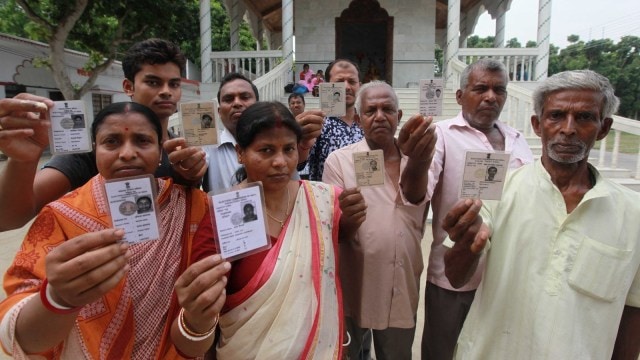
The Matuas of Bengal are back in the national spotlight. The key reasons behind this are the notification of the Citizenship (Amendment) Rules, 2024 on March 11, and the fact that it is election season and the Matuas are a necessary vote bank, even outside West Bengal. It is therefore important to understand the present politics around Matua votes and how it is unfolding on the ground as the 18th Lok Sabha polls get underway. There are four major strands of this politics that will decide how the Matuas vote: The citizenship conundrum, communal polarisation, political deification of Matua icons, and the feud within the Thakur family along party lines.
The citizenship question
The citizenship question has been at the core of Matua politics. From 2004, the Matuas led a movement against the Citizenship (Amendment) Act, 2003, which turned refugees who came from Bangladesh after 1971 into “illegal migrants”. Many faced bureaucratic hurdles, police questioning, even arrests, for the absence of adequate documents. In short, they became suspect citizens. The demand of the Matuas, therefore, has been “unconditional citizenship” in India. The Citizenship (Amendment) Act (CAA), 2019, partially addressed their demands as it revised the cut-off date for entering India to December 31, 2014, and reduced the period of naturalisation to five years for migrants belonging to six religions from three specific countries. The Matuas largely supported the legislation, and the BJP, with the hope that the suspicion around their citizenship status would finally end.
However, the March 11 notification has complicated the picture. It has generated confusion within the community about the application procedure for acquiring citizenship, documents required, coupled with a genuine fear of disenfranchisement during the process. On the one hand, the BJP leadership has been assuring voters that the identity cards issued by the Matua Mahasangha, or certificates to be given by the local Matua organisation or priest, if needed, will suffice as documentary proofs. The TMC as well as other political parties and civil society groups, on the other hand, are campaigning that an application for citizenship under these rules would automatically turn the applicant, who is already a citizen, into a non-citizen. Amidst these claims and counterclaims, the mood of the Matuas on the ground, as one interlocutor succinctly put it, is in favour of a “go-slow policy” (dheere chalo niti) till the election is over. Since the citizenship conundrum remains unresolved, it is now uncertain if the BJP will be able to get Matua votes as per its expectations.
Second, the politics of citizenship is also an issue of communal polarisation. In Indian politics, migrants are often categorised into two groups: Infiltrator (ghuspeti) and refugee (sharnarthi), based on their religious identities. The BJP has strategically used this binary to create social antagonisms and mobilise Hindu votes, particularly in the border states. This strategy has also been deployed to mobilise Matuas. A recent example of this is a “threat” letter purportedly sent by terror outfit Lashkar-e-Taiba to Shantanu Thakur, the Matua scion and BJP leader contesting from Bongaon constituency. The letter threatened to destroy the headquarters of the Matua Mahasangha if a National Register of Citizens is prepared. Since Thakur is also revered as a religious figure, such an allegation made by him just before the elections is telling. Moreover, what is interesting to note is the political engineering the CAA 2019 manages — the law made the members of an anti-caste religious community uncritically identify themselves as Hindus, albeit for instrumental reasons, and pitted them against the Muslims.
Political deification of Matua icons
Third, a vital campaign issue is the political deification of Matua icons like Harichand and Guruchand Thakur, that is, the strategic use of their names, images, life histories, teachings and temples. For instance, Matua leader Mamata Bala Thakur recently alleged that she was not allowed to take oath as a Member of Parliament in the name of Harichand Thakur, and such a denial by the chairperson of the Rajya Sabha was an “insult” to the Matuas. Similarly, Matuas demanded an apology from TMC supremo Mamata Banerjee for mispronouncing the names of Harichand and Guruchand last year. It is now imperative for political leaders to deify Matua icons, use their images and community symbols as campaign tools for electoral success. Observers may have noticed that many leaders, including Narendra Modi, commemorated Harichand Thakur on the eve of his birth anniversary in early April.
Factionalism within the Matua heirs
Finally, the factionalism within the Thakur family, the heirs of Harichand who enjoy supreme religious authority, is transforming Matua politics. The clash between the two factions began almost a decade ago over control of the Matua Mahasangha and its properties, and eventually became partisan in nature. Increasingly, the BJP camp led by Shantanu Thakur is amalgamating the Matua identity with Hindutva politics. The Matua slogan “Joy Hari bol” is being raised in tandem with “Jai Shree Ram”. To counter this politics of appropriation, the TMC faction, led by Mamata Bala Thakur, is upholding the Matua identitarian interests to keep the party’s grip over the organisation afloat. Close ties with the Thakurs help the parties to reach out to Matua voters. The BJP has been using Shantanu Thakur as a campaigner in Matua-populated constituencies even outside West Bengal, like the Andaman and Nicobar Islands. The family feud, manoeuvred by parties, has also given rise to non-dynastic Matua leaders. Who is going to benefit from this changing politics now depends on how the “go-slow” mood on the ground unfolds on the poll days.
The author is an independent researcher
© The Indian Express Pvt Ltd
First uploaded on: 24-04-2024 at 16:03 IST


